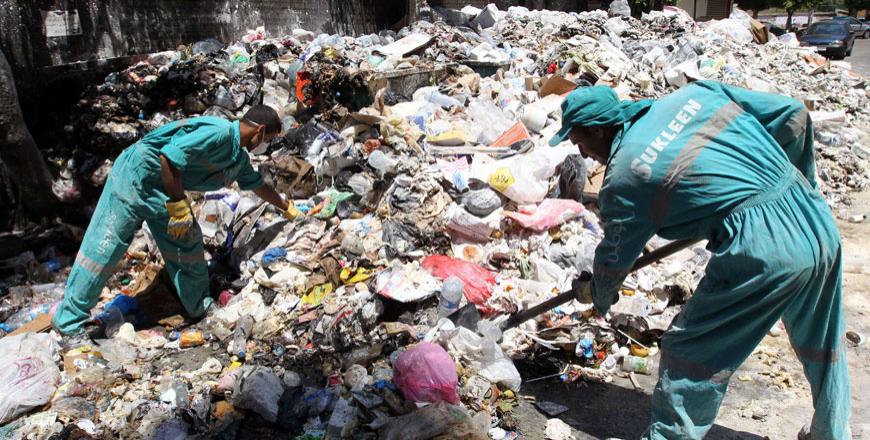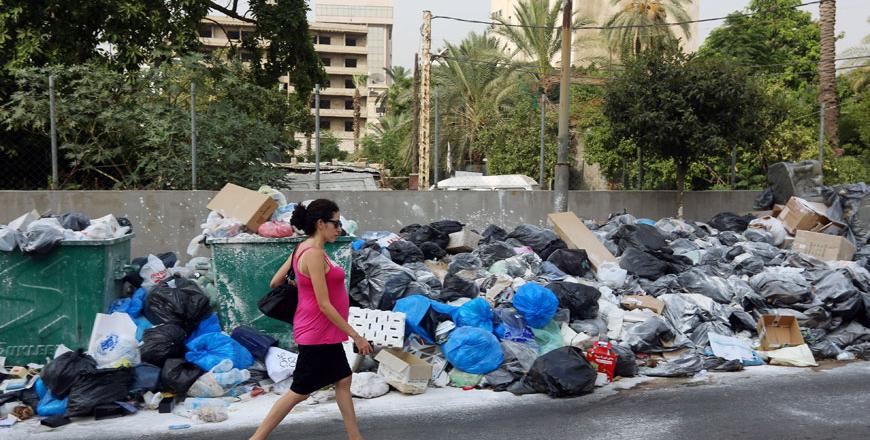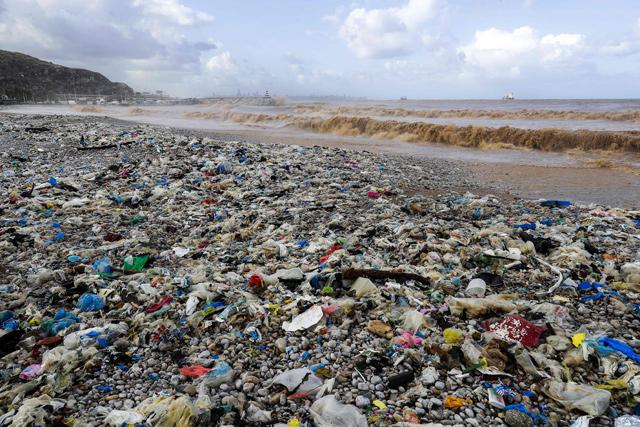You are here
In garbage crisis, Lebanon chokes on bad air and bad politics
By Reuters - Feb 03,2016 - Last updated at Feb 03,2016
BEIRUT — Lebanon's government is so dysfunctional, Beirut stinks. And now it's getting dangerous.
Six months ago, the authorities shut the main landfill site for garbage from the capital, without providing an alternative. Since then, rubbish collection has halted and festering trash has piled up in the city streets, causing what researchers and campaigners now say is a public health emergency.
Officials say they will resolve the crisis by paying a foreign company to ship rubbish abroad, although even the minister in charge calls the plan "crazy".
Activists say it is proof that a governing system, set up 25 years ago to share power among feuding sectarian groups and end a multi-sided civil war, has become so inefficient and corrupt that it is no longer capable of providing even basic services.
"We are not asking for an impossible thing," said Wadih Al Asmar, organiser of YouStink, a group formed last year to protest against the rubbish crisis. "It's obvious all countries should have a strategic plan on waste management."
Untreated, unmanaged rubbish threatens the water supply, academics say. Hills of waste rise from makeshift dumps across the city and surrounding areas, including the banks of Beirut River just metres from where it meets the Mediterranean.
Garbage has been burnt, including in the normally lovely forests around Beirut, filling the air with foul smoke that contains dangerous levels of pollutants.
As waste burns, carcinogens in the air increase by at least 2,300 per cent, and metals including lead and arsenic increase by 98-1,448 per cent, a study by the American University of Beirut and the Lebanese National Council for Scientific Research (CNRS) found.
"In an almost closed area like Beirut with increasingly tall buildings, this leads to a kind of suffocation," CNRS secretary general Mouin Hamza told a news conference. "Burning waste is suicidal."
Crazy solution, crazy people
The Lebanese system of government stitched back together after the war carefully balances the interests of Sunni, Shiite, Christian and Druze groups. But the need for consensus in decision-making makes it easy for regional and community leaders to veto planning decisions.
And nobody wants a garbage dump in their backyard.
The government's solution is a plan to pay a British firm to ship waste abroad.
"It's a crazy solution in a country of crazy people," Agriculture Minister Akram Chehayeb, placed in charge of resolving the crisis, said on national television.
The plan would cost $193 per tonne to get rid of the waste, Chehayeb told Reuters. That is more than a third more than the $140 a tonne Beirut's waste management company Sukleen says it charged to clear away waste before the landfill closed last year. Chehayeb expects 2,000-2,500 tonnes of rubbish a day to be shipped, which works out to up to $176 million a year.
Chehayeb told Reuters the export of new and old waste by Britain's Chinook Urban Mining would begin on February 28. But previous deadlines have repeatedly been missed, the finance minister has criticised the programme's cost, and anti-corruption and environmental campaign groups have raised concerns about the lack of transparency in the tender process.
Chinook, which describes itself as Britain's premier developer of technology to produce clean energy by burning rubbish, confirmed it has been awarded the contract. It would not disclose to Reuters what it will do with the Lebanese trash or where it will ship it.
Local media have quoted Nabil Jisr, head of the Council for Development and Reconstruction, a government body, saying the rubbish would be sent to Russia.
Six months is a long time in waste management: the area produced around 3,000 tonnes of refuse a day before the crisis, according to the company that collects it, meaning around half a million tonnes of untreated trash has had nowhere to go.
"At night we can smell very strong gas," said Samir Abdelnur, who said he closes his grocery shop near the busy Karantina port earlier now because of the smell and the flies from the temporary garbage mountain facing his store.
"Fewer people are stopping to buy things."
A bad smell
Frustrated activists and citizens point the finger at Lebanon's paralysed political system, made worse because of sectarian tension that has increased with Syria's civil war next door. The government has not passed a budget since 2005 and has been without a president for over a year and a half.
The country's infrastructure is under extra pressure from more than 1 million Syrian refugees who have joined the 4.5 million Lebanese.
As rubbish rotted in last year's suffocating summer heat, protests broke out and anti-government movements such as "You Stink" and "We Want Accountability" crystallised. Protests were frequent but have now largely fizzled out after a security crackdown.
A woman named Lara, detained last year after a protest at the parliament, said: "The government should be responsible for collecting garbage. It is a basic right not to have garbage lying around everywhere in Beirut."
A long-term recycling and waste management plan proposed by a committee of experts late last year failed to make it off the ground because communities rejected proposed new landfill sites.
In Akkar, 120km north of Beirut, residents rejected plans to upgrade an existing rubbish dump into a managed landfill to take some of Beirut's waste, despite being offered around $100 million in development grants, local campaigner Antoine Daher told Reuters.
Lebanese are used to finding other solutions when the state fails: the water and electricity systems have yet to be fully repaired since the civil war ended, but expensive private water suppliers and street-level power generators have stepped in.
Similarly, a local body, the Higher Chouf Municipalities Federation, has stepped in to deal with the garbage crisis in villages in the hills overlooking Beirut, pooling funds and donations to build a waste sorting and composting facility.
Sami Atallah, director of the Lebanese Centre for Policy Studies, said structures exist for municipalities to manage rubbish systems. The American University waste task force has published a guide showing how municipalities can build facilities. But the government has shown little interest.
"Central government is still trying to monopolise the sector," Atallah said. "There is money to be made and they are trying to figure out how to split the pie."
Related Articles
BEIRUT — Trash collection resumed in Lebanon's capital Beirut after an almost week-long crisis that has seen streets overflowing with waste
BEIRUT — It's summer in this proud Mediterranean city, with celebrities and Lebanese expats flocking to international festivals and parties
BEIRUT — Sitting at a plastic table outside her flatbread sandwich shop in the Lebanese capital, Nadime Yazbeck says she wishes the governme














